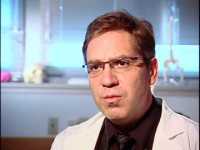12 Jan Stem Cell Derived Growth Factors May Slow Progression of ALS

Prof. Dimitrios Karussis
MedicalResearch.com Interview with:
Prof. Dimitrios Karussis M.D., Ph.D.
Professor of Neurology
Head, Multiple Sclerosis Center
Hadassah BrainLabs
Medical Research: What is the background for this study? What are the main findings?
Prof. Karussis: BrainStorm Cell Therapeutics is developing innovative, autologous stem cell therapies for highly debilitating neurodegenerative diseases such as Amyotrophic Lateral Sclerosis (ALS), Multiple Sclerosis (MS), and Parkinson’s Disease (PD). Our technology, NurOwn™ is a first-of-its-kind approach that induces autologous bone marrow-derived Mesenchymal Stem Cells (MSCs) to secrete Neurotrophic Growth Factors (NTFs). These MSC-NTF cells have been shown to be protective in several animal models of neurodegenerative diseases.
Data from the clinical trials described in the recent issue of the Journal of American Medicine – Neurology (JAMA Neurology), suggest that NurOwn can help patients with ALS. The two trials featured in the article, a phase 1/2 and a phase 2a, studied the transplantation NurOwn cells in ALS patients. These trials confirmed the excellent safety profile of NurOwn and suggest a clinically meaningful effect. The investigators used two well established clinical endpoints that measure disease activity in ALS, the Revised ALS Functional Rating Scale and Forced Vital Capacity, and were able demonstrate a slowing of disease activity in the period following treatment.
Medical Research: What should clinicians and patients take away from your report?
Prof. Karussis: The data provide strong indications of clinically meaningful beneficial effects. Brainstorm’s goal is to provide ALS patients with a treatment that can stop the progression and induce some kind of recovery. This treatment has the potential to become one of the major clinical tools to treat degenerative diseases of the brain and spinal cord.
Medical Research: What recommendations do you have for future research as a result of this study?
Prof. Karussis: There is a very urgent need for innovation in the treatment of central nervous system (CNS) disorders and we are engaged in a number of clinical trials designed to treat or cure these debilitating illnesses. We are obviously pleased to have reported such significant findings, and are proud that the results of these recent trials validate the potential of NurOwn to positively impact the treatment of patients with ALS. The results of these trials have informed the design of our ongoing placebo-controlled multicenter phase 2 clinical program, as well as our planned multidose trial in Israel, which are expected to provide further confirmation of the benefits of NurOwn.
Citation:
[wysija_form id=”5″]
Prof. Dimitrios Karussis (2016). Stem Cell Derived Growth Factors May Slow Progression of ALS MedicalResearch.com
Last Updated on January 12, 2016 by Marie Benz MD FAAD
